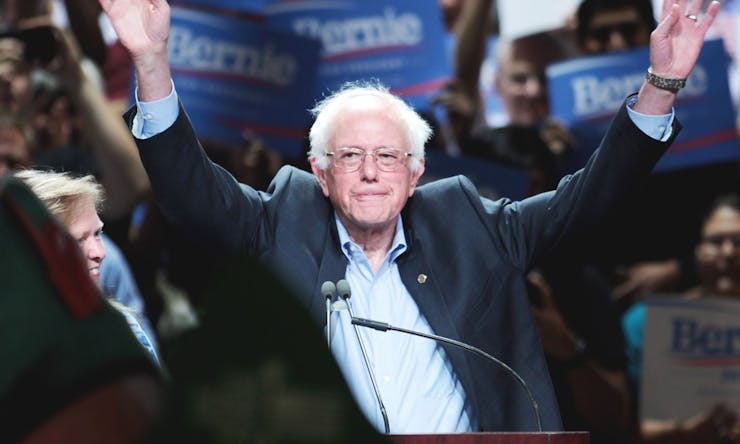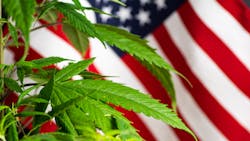Editor’s Note: Marcus H. Johnson is a national political writer whose essays appear on Weekend Politics, Medium, and other outlets. This is the first in a series of opinion pieces, by Johnson and others, that will appear on Leafly in the run-up to the November 2016 election.
Bernie Sanders is the biggest cannabis legalization advocate to ever seriously contend for the presidency. He’s built a formidable campaign and fundamentally changed the way Hillary Clinton has run, from her policy positions to her messaging to her voter outreach. He dueled Clinton to a dead heat in Iowa, trounced her in New Hampshire, and pulled off a Michigan upset that confounded pollsters and pundits alike. His clear position on cannabis — a complete end to federal prohibition — is seen as a strength when set against Clinton’s half-hearted appeal for “more research.”
So why isn’t the cannabis industry doing more to support Sanders?
Money doesn’t lie. In 2015, the National Cannabis Industry Association (NCIA) and the Marijuana Policy Project together donated $24,500 to Rand Paul’s campaign, while offering only $1,000 to Sanders. This year the cannabis industry is almost completely absent from Sanders’ donation records. NCIA lobbyist Michael Correia has given $500 to Bernie. Beyond that, Federal Election Commission records show only a bunch of budtenders and growers tossing in $10 and $25 donations.
The absence of support is glaring. People are asking questions. Shouldn’t the movement and the industry be doing more to feel the Bern?
Not necessarily. Here’s why.
First, the numbers don’t add up. Despite Bernie’s enthusiastic crowds and his fundraising juggernaut, he’s still fallen behind Hillary Clinton by approximately 320 pledged delegates. That’s an all but insurmountable lead. Even strong victories in the delegate-light western states today (Arizona, Idaho, and Utah) probably won’t be enough to propel him past Clinton. Not when he’s unlikely to win delegate-rich states such as New York, California, and Maryland by the margins he’d need to catch her. There’s no sense throwing political and financial capital behind a presidential candidate who’s highly unlikely to win the nomination, especially when those resources could be better spent elsewhere.
Here’s a better reason to hold back on Bernie: That money, energy, and influence can be much better used at the state and local level.
Here legalization advocates can learn something from marriage equality advocates, who used state victories—not presidential support—to propel them to success on the federal level.
States, Not Presidents: How Marriage Equality Became the Law of the Land
It’s easy in hindsight to think that marriage equality was inevitable, that the issue enjoyed slow and steady march toward victory. But that couldn’t be further from the truth. In 1996, the Defense of Marriage Act (DOMA) made it illegal to federally recognize marriages between two men or two women. The future for nationwide legalization looked bleak.
From 2003 to 2007, Massachusetts was the only state to recognize same-sex marriages. By 2010, that number had only marginally improved to include New Hampshire, Vermont, Iowa, Connecticut, and the non-state of D.C. Nationwide acceptance still looked to be decades away, especially after a string of statewide legislative defeats that included the perennial blue state of California.
The major breakthrough came in 2012, when Maine, Washington State, Maryland, and Minnesota all voted to legalize marriage equality. Those four states created a sense of momentum, and by 2013, 18 states had legalized. A national law was openly discussed, something that would have seemed impossible only five years prior. And finally in June 2015 came the Supreme Court decision in Obergefell v. Hodges, which made marriage equality the law of the land.
Using Language and Humanization to Change Hearts and Minds
What changed? Polling done by advocacy groups found that a large portion of the voting public believed marriage equality would fundamentally change the institution of marriage itself. In many cases, when the issue was raised opponents primarily associated it with gay sex, not marriage.
What advocacy groups like Freedom to Marry did not do was put all their hope, faith, and money behind a national candidate like Barack Obama, whose position on marriage equality was famously “evolving” very slowly. (Freedom to Marry donated nothing to Obama in 2008, and only around $6,000 in 2012.) Instead, those groups changed how they framed their argument. They began humanizing gay and lesbian couples. They spoke about how these couples deserved the right to make medical care decisions for their spouses, and how they were unfairly denied military and other government benefits. The argument boiled down to a central point: You shouldn’t be punished for who you love.
Framing the issue and controlling the narrative is how you win arguments. For a long time, opponents believed that gay and lesbian marriage was about sex, and they used this outlook to suppress public support for the issue. But humanization is a powerful tool, and the turning point in the fight to legalize came when advocates showed that it was about love, something that all humans desire and want for each other. They also changed the language frame from “gay marriage” to “marriage equality.” When the public saw that real people were being punished simply for loving another person, changing hearts and minds became a lot easier.
The cannabis legalization movement can learn from this, and in many ways already has.
Legalization opponents often frame the issue as an argument about college kids chasing a high and rejecting their societal responsibilities. But medical advances and clinical studies have shown that cannabis has tremendous potential for treating cancers and certain types of epilepsy. Legalization advocates have a powerful humanization tool in medical marijuana, which is quite literally changing lives. You change hearts and minds when you show people that the old narratives around cannabis are wrong. It isn’t all about a recreational high. It is about improving quality of life.
The Path Forward For Marijuana Legalization Advocates
While it still feels as if marijuana legalization on the federal level is far away, that isn’t necessarily the case. As the marriage equality issue showed, massive change can happen very quickly. In 2013, only 18 states had legalized gay and lesbian marriage. By 2015, it was legal nationwide.
Cannabis legalization advocates should follow the playbook of humanization, showing the public that legalization is about improving quality of life, not simply decriminalizing a recreational pursuit. As with marriage equality, a string of statewide legalization victories for marijuana advocates could create the momentum necessary to push for a federal law, new federal DEA standards, or a favorable Supreme Court ruling.
While backing Bernie Sanders and his cannabis legalization platform now might seem like an attractive choice, the delegate math is nearly impossible to overcome. It would be better to use that political and financial capital on statewide battles in 2016 and over the next several years. Several more statewide wins would build on the momentum established in 2012. Changing hearts and minds along the way would do even more for the cause. Bernie Sanders’s support for legalization is groundbreaking, and it is heartening. But it isn’t the key to ending federal prohibition. Shout and vote for Bernie all you want, cannabis advocates. But put your time, energy, and money where it will do the most good: Act locally.
Image Source: Gage Skidmore via Flickr Creative Commons








